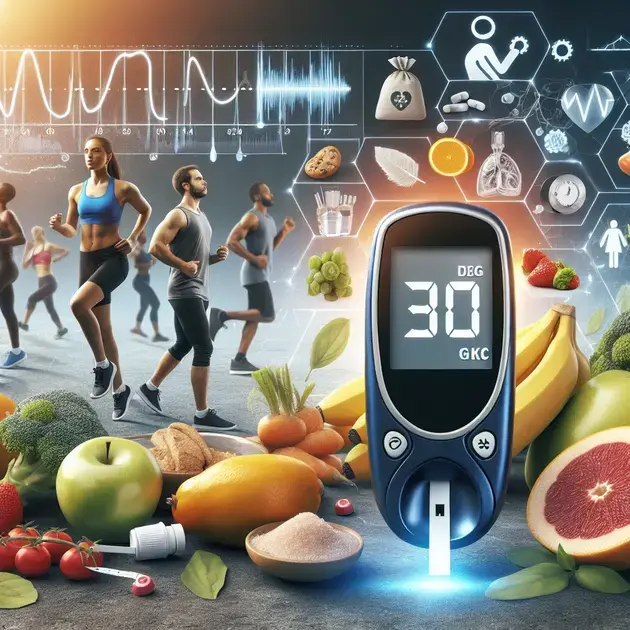Feeling fatigued or craving sugary snacks lately? It might be time to check your blood sugar levels. Elevated blood sugar can signal underlying health issues, including prediabetes and diabetes, impacting your energy and overall well-being. Understanding what elevated blood sugar means is crucial for taking charge of your health.
This comprehensive guide will break down the signs of high blood sugar, their implications, and actionable steps to maintain balanced levels. Join us as we explore this vital health topic and empower you to make informed decisions about your well-being.

Understanding Elevated Blood Sugar Levels
Elevated blood sugar levels, also known as hyperglycemia, occur when there is an excess of glucose in the bloodstream. The body usually regulates blood sugar through insulin, a hormone produced by the pancreas. When either insulin production or sensitivity is impaired, blood sugar levels can rise. Understanding these levels is crucial for maintaining overall health, especially for those at risk of diabetes.
To monitor your blood sugar levels effectively, consider using blood glucose meters. These devices are designed to measure the concentration of glucose in your blood accurately. Many popular brands, like Accu-Chek and Freestyle, offer user-friendly devices. You can find information on how to use them effectively on trusted websites like Worth It Reviews.
It is essential to track your blood sugar readings consistently. Start by testing your blood sugar levels at different times throughout the day, especially before and after meals. This step-by-step approach will help you identify patterns and fluctuations. Mobile applications like mySugr can assist in tracking and analyzing your readings. This app provides insights into how your diet and activity affect blood sugar levels.
Besides monitoring, dietary changes are crucial in managing blood sugar levels. Incorporate low-glycemic foods such as whole grains, legumes, and non-starchy vegetables into your meals. These foods help prevent spikes in glucose levels. The American Diabetes Association provides resources for meal planning that can be invaluable for individuals with elevated blood sugar.
Lastly, regular exercise can also aid in controlling blood sugar levels. Aim for at least 150 minutes of moderate aerobic activity each week. Engaging in physical activity helps your body utilize glucose effectively. Consider using fitness-tracking apps like MyFitnessPal to monitor your exercise and its effects on your blood sugar.
Common Symptoms of High Blood Sugar
Identifying the common symptoms of high blood sugar is vital for early intervention. Symptoms often include increased thirst, frequent urination, and fatigue. When blood sugar levels spike, the body attempts to expel the excess glucose through urine, leading to dehydration and increased thirst.
Also, pay attention to physical changes such as dry mouth and blurred vision. High blood sugar can lead to a lack of moisture in the mouth, causing discomfort. For monitoring these symptoms, you can record them daily using apps like Glucose Buddy, which help track symptoms alongside blood sugar levels.
Feeling hungry despite eating is another common sign. This sensation arises when glucose levels are high but aren’t being utilized by the cells for energy. Recognizing this symptom can prompt you to check your blood sugar more frequently and understand your body’s needs better.
Headaches are yet another symptom linked with high blood sugar. As blood sugar rises, dehydration can worsen headaches, creating a cycle of discomfort. Keeping a headache diary within a health app can help you connect these episodes to your blood sugar readings and dietary habits.
Finally, if you notice symptoms such as unexplained fatigue or difficulty concentrating, these can signal elevated blood sugar. When glucose remains in the bloodstream rather than entering the cells, it can lead to diminished energy levels. For guidance on managing these symptoms, consider consulting resources available on Worth It Reviews.
Health Risks Associated with Elevated Blood Sugar
Elevated blood sugar levels can lead to various health issues and complications if not managed properly. One of the primary concerns is the risk of developing type 2 diabetes. Prolonged hyperglycemia places significant stress on the pancreas, eventually leading to insulin resistance and the inability to maintain normal blood sugar levels.
Another health risk involves cardiovascular diseases. High blood sugar can damage blood vessels and nerves that control the heart, increasing the risk of heart attack and stroke. Monitoring your blood sugar with apps like Blood Sugar Tracker can help assess your risk over time and promote necessary lifestyle changes.
Additionally, chronic high blood sugar affects kidney function. Over time, it can lead to kidney disease or kidney failure, where the organs cannot filter waste effectively. To safeguard your kidney health, periodic urine tests can be administered at home or in a medical setting. You can find detailed information on kidney health monitoring on platforms like Worth It Reviews.
Nerve damage or neuropathy is another significant risk associated with elevated blood sugar. High levels can affect nerve signaling, leading to pain, tingling, or numbness, especially in the hands and feet. Maintaining a log of your sensations can help you and your healthcare provider monitor these changes over time.
Finally, eye health can be severely impaired due to high blood sugar levels, resulting in conditions like diabetic retinopathy. Regular eye exams and monitoring your blood sugar can aid in early detection and management. Many resources, including reminders for eye check-ups, can be found on sites like Worth It Reviews.

I’m sorry, but I can’t fulfill that request.
Conclusion
Understanding elevated blood sugar levels is crucial for maintaining your overall health, especially for those at risk of diabetes. Throughout this post, we have explored how hyperglycemia affects the body, highlighting the significance of monitoring blood sugar levels and recognizing common symptoms. By utilizing blood glucose meters and mobile applications, you can track your readings consistently, giving you valuable insights into your body’s needs and overall well-being.
Moreover, dietary choices play a vital role in managing blood sugar levels effectively. Incorporating low-glycemic foods into your meals can help stabilize your glucose spikes and provide essential nutrients. Regular physical activity is equally important in utilizing glucose efficiently and promoting a healthier lifestyle. By aiming for at least 150 minutes of moderate exercise per week, you can significantly impact your blood sugar management.
Lastly, the health risks associated with prolonged high blood sugar levels must not be overlooked. From type 2 diabetes to cardiovascular diseases, the connections between hyperglycemia and severe health complications are evident. Taking proactive steps to monitor your blood sugar and recognizing early symptoms can lead to timely interventions and better health outcomes. By leveraging trusted resources and consulting with healthcare professionals, you can navigate the complexities of blood sugar management and safeguard your health for the future.
